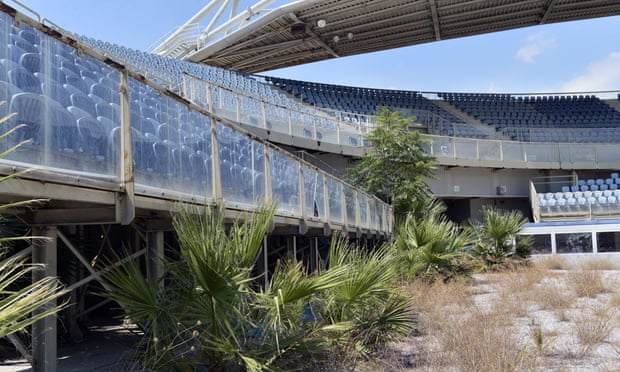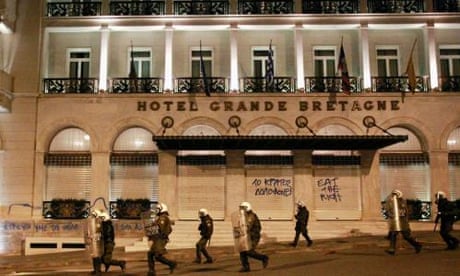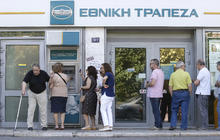Greece needs to sell off €50bn worth of state assets such as airports and marinas quickly as part of its third bailout deal. But is such a plan realistic?

The neglected, overgrown beach volleyball stadium in Athens. Most of the newly constructed stadiums for the 2004 Games now lie abandoned. Photograph: Milos Bicanski/Getty Images
In the early days of the Greek debt crisis, two German politicians came up with a radical solution: Greece should sell off some of its uninhabited islands and property to pay back its creditors. “Sell your islands you bankrupt Greeks! And sell the Acropolis too!” was how the German tabloid Bild summed up their idea.
While selling off ancient monuments was never a serious idea, the privatisation of state assets has always been an integral feature of Greece’s international bailouts. Over the past five years, Greece has faltered on promises to sell vital parts of its infrastructure – ports, airports, marinas and waterworks – in exchange for billions of euros in loans.

Talks on third bailout deal get off to a poor start as troika mission chiefs and Athens fail to agree on where visitors will stay over security concerns
Privatisation remains a vital element of Greece’s latest bailout deal. Under threat of being forced out of the Eurozone, Athens agreed to transfer “valuable assets” to an independent fund, with the aim of raising €50bn (£35bn). Half the proceeds will be used to shore up capital reserves at Greek banks; a quarter will be used to repay Greece’s creditors, and the remainder will be spent on unspecified investments.
The privatisation fund was the issue that almost forced a Grexit at the marathon 17-hour, all-night summit of European leaders in Brussels earlier this month. “It was the only thing discussed at the summit,” recalls one diplomat.
At 6am, as Greece teetered on the brink of leaving the euro, the Greek prime minister, Alexis Tsipras, was still haggling over privatisation details with his counterparts, Angela Merkel and François Hollande.
The idea of the privatisation fund first emerged in a leaked German government paper which argued Greece should leave the Eurozone if it did not agree to put €50bn in a Luxembourg fund as collateral for its debts. Although drafted in Berlin, the plan soon found support among Greece’s hard-line creditors in central Europe and the Baltics.
After a marathon summit, the 19 Eurozone leaders have seen off the prospects of Grexit. Here are the main points that were agreed
Read more
Tsipras wrung two concessions: the fund would be run from Athens, not Luxembourg, and a tranche of the cash would be earmarked for investments in Greece.
The privatisation fund is likely to remain one of the most contentious issues as Greece and its creditors strive to conclude bailout talks by mid-August.
From the creditors’ perspective, Greek privatisation has been failure heaped upon failure. In 2011, international creditors decreed that Athens would raise €50bn by the end of 2015 from selling state assets. By early 2015, only €3.2bn had been raised; none of the most sensitive aspects – airports, ports, railways – had been sold. Neither officials at the European commission nor the International Monetary Fund are taking the €50bn target remotely seriously.
In a devastating analysis of Greece’s debt burden published in July, the IMF said it was realistic to assume asset sales would be worth no more than €500m a year – meaning it could take 100 years to raise €50bn.
Gabriel Sterne at Oxford Economics argues that the IMF has failed to learn from its recent history that “less is more” when it comes to setting numerical targets. “It is economics versus faith – ‘Somehow we will make this work even if it doesn’t add up’ – but the economics really doesn’t add up.”
When Syriza swept to power in January, one of its first actions was to sack the people in charge of Greece’s privatisation agency and cancel plans to sell Greece’s electricity transmission operator (ADMIE). The sale of other assets – most notably regional airports and the port of Piraeus – had almost been completed, but was thrown into doubt. The government is expected to put up little resistance to the sales now being concluded. Venues purpose-built for the 2004 Athens Olympic games, which have sat derelict and rotting for the past decade, will also be among the assets moved to the fund, alongside state utilities, including the water board and ADMIE.
Both Russia and China have expressed interest in snapping up the state-run railway network, one of the biggest encumbrances on public finances before the debt crisis erupted in late 2009. The Greek state is also rich in buildings bequeathed by individuals to municipalities and the Orthodox Church – properties that are also expected to be included in the fund. Contrary to popular perception, the public sector owns very few islands. The sale last week to Hollywood star Johnny Depp of the Aegean islet of Stroggilo, for a reputed €4.2m, was conducted privately.
While Tsipras has been forced into a humiliating climb-down over the sale of state assets, he has repeatedly branded the entire bailout plan as a bad deal that he doesn’t believe in.
Unions with ties to the governing party have already vowed to “wage war” to stop the sale of docks in Piraeus, where the Chinese conglomerate, Cosco, currently manages three piers. With the debt-stricken country on its knees, officials have stressed that the prime minister will fight to ensure the denationalisations are not seen as a fire sale.
However, independent observers fear just that. “Privatisation in Greece right now means a fire sale,” political economist Jens Bastian said.
Bastian was one of the officials responsible for privatisation under the European commission’s Taskforce for Greece, a body of experts distinct from the troika. He thinks it was a “political mistake” to set a target to raise €50bn from asset sales, in the absence of support from Greek politicians across the political spectrum, from the centre-right New Democracy party, to Pasok on the centre-left and Syriza on the left.
“We have never had a political majority to embrace the idea of privatisation. How are you going to create the political momentum that has been absent in the past years under more difficult conditions today?” he asks.
Greece’s creditors share such scepticism. Their answer is tighter controls. The privatisation fund will be managed by Greeks under the close watch of creditors.
The privatisation fund has few precedents, although it has been compared to the Treuhandanstalt, the German agency created in the dying days of the GDR to privatise East German assets shortly before reunification. Greece’s former finance minister, Yanis Varoufakis, was one of the first to draw the parallel, although others offer the comparison unprompted. Peter Doyle, a former IMF economist, says the Treuhand offers the closest parallels: the agency had full control over government ministries to sell assets quickly. “The principal task was to sell these things to somebody for cash.”
Greek government officials and opposition politicians said it was too early to know how the Greek fund would operate.
“We’ve got a long way to go before we have a clear picture of what this fund and the privatisation scheme will entail,” Anna Asimakopoulou, shadow finance minister with the main opposition New Democracy party, told the Guardian. “But the entire privatisation process will feature large in negotiations because Tsipras is so opposed to them and creditors see them as a good way to raise revenues.”
Greece has an urgent need for cash: although the Eurozone bailout is meant to be worth up to €86bn, only €50bn is on the table, via the Eurozone's bailout fund, the European Stability Mechanism.
Doyle thinks Greece’s bailout is underfunded. “The Europeans just don’t have enough cash ... and a major way to fill that gap is through privatisation.” Officials at the Greek privatisation agency are “going to find their arms very strongly twisted to provide needed cash”, he says.
“The privatisation agency is facing a trade off between doing something that is fair and open and following judicial procedures, or something that is going to deliver needed cash.”
He fears Greece could be heading down the path taken by Russia in the 1990s, when valuable state assets were sold at knockdown prices to raise urgently-needed cash, creating a new oligarch class in the process.
“The very thing we all think that Greece needs – to get rid of its oligarchy – will in fact be entrenched by privatisation done this way,” argues Doyle, who worked on privatisations in the Czech Republic, Slovakia and Poland in the 1990s. The difference between those countries and Greece, he thinks, is that the population and political class in central Europe accepted the idea of privatisation, despite the short-term hardships.
He is convinced the current privatisation plan for Greece is doomed to fail. “The programme was set up to encourage Greece to leave the euro and that plan didn’t work, so now we are stuck with the privatisation arrangement that nobody, not even the original creditors, ever intended to happen.”
Up for sale
- Helliniko Olympic complex
- Ports of Piraeus and Thessaloniki
- 14 regional airports
- PPC power company, including ADMIE, the electricity transmission operator
- DEPA natural gas company
- Hellenic Petroleum
- Hellenic Post
- Athens Water Supply and Sewerage Company
- Xenia Hotels in Rhodes
- Marinas of Chios, Pylos and other locations
Source: Hellenic Republic Asset Development Fund
© 2015 Guardian News and Media Limited or its affiliated companies. All rights reserved.
![The [Greek] European Tragedy](https://blogger.googleusercontent.com/img/b/R29vZ2xl/AVvXsEiWKI5s90SFm1wWTk6bs4p7CgslaC2SnYPsrZhb-B-smOufNNCSxCvpBLI9hOB-LsXZjir_PNmEiMk2-E62F3xkg96IoC6QFAaZAnPRTVH340IN9WBRmWJqPkjWlgyRj3zpALp7h6hvA58/s920/GkBack_new.jpg)















 Photo: Finance minister Euclid Tsakalotos wrote Greece was "seeking a new loan" from the IMF in a letter to managing director Christine Lagarde. (AFP: Angelos Tzortzinis)
Photo: Finance minister Euclid Tsakalotos wrote Greece was "seeking a new loan" from the IMF in a letter to managing director Christine Lagarde. (AFP: Angelos Tzortzinis) 
 Panagiotis Douvos stands in his Greek deli in downtown Sofia, one of many Greek businessmen who have moved to Bulgaria faced with a deep economic crisis at home © AFP Dimitar Dilkoff
Panagiotis Douvos stands in his Greek deli in downtown Sofia, one of many Greek businessmen who have moved to Bulgaria faced with a deep economic crisis at home © AFP Dimitar Dilkoff 
 The swearing-in ceremony of the newly appointed members of the Government at the presidential palace in Athens (Rex)
The swearing-in ceremony of the newly appointed members of the Government at the presidential palace in Athens (Rex)  Deputy Finance Minister, Nadia Valavani, resigned ahead of last Wednesday’s vote (AFP)
Deputy Finance Minister, Nadia Valavani, resigned ahead of last Wednesday’s vote (AFP)  Photo: Yanis Varoufakis resigned as finance minister over the latest austerity measures
Photo: Yanis Varoufakis resigned as finance minister over the latest austerity measures 
